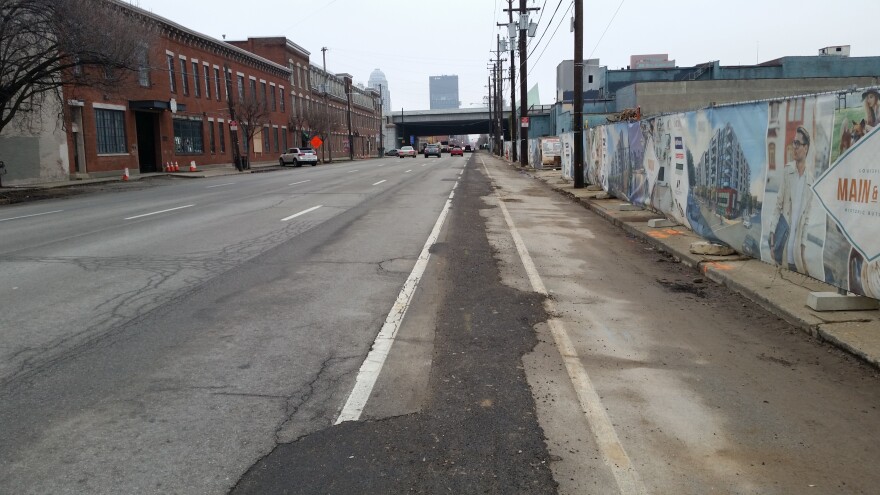A push from Louisville’s Metro Council last year to get more funding for road repair helped fuel the city’s largest repaving effort in recent years.
As budget discussions wound down in June 2015, council members decided to delay some bond payments to funnel an additional $5 million for road resurfacing efforts, bringing the total allocation for road repair to more than $13 million.
At the time, Councilman Kelly Downard, a Republican from District 16 and vice chairman of the budget committee, said the move would “yield one of the most significant investments in paving and road improvements that this community has seen.”
Downard’s statement was prescient, according to Metro Public Works data obtained and analyzed by WFPL News.
Nearly 630 Metro-maintained roads were resurfaced during 2015, and much of the work came after the budget was approved by the Metro Council, the data show.
The work led to more than 440,000 feet of fresh pavement — laid in all but one of the city’s 26 council districts, the data show.
These totals tower over the work of previous years.
From 2011 to 2014, an average of 270 roads were resurfaced each year, according to city data. The most expansive road repair effort in recent years was in 2013, when just more than 250,000 feet of roadway was resurfaced.
But road improvements haven't been distributed equally across the city.
Downard’s district, in the northeast corner of Jefferson County, had more roads resurfaced than any other district during 2015, the data show. Nearly 70 roads were repaved in District 16, amounting to more than 55,000 feet of roadway.
In contrast, District 5 in northwest Jefferson County had no road repair during the 2015 paving season, the data show.
In fact, District 5 has received the least amount of road repair work among council districts since 2011. During that time, only 14 roads have been resurfaced, amounting to 6,388 feet of fresh roadway.
The other 25 districts across the city have had an average of 65 roads repaired during that same time, the public works data show.
Democrat Cheri Bryant Hamilton represents District 5. She did not respond to a request for comment.
The lack of road resurface work in District 5 is similar to other districts in urban areas. The data show suburban areas consistently reap more robust resurfacing efforts than their urban counterparts.
Part of that divide is due, generally, to suburban districts covering more geographic area; they have more miles of roadways.
Harold Adams, a spokesman for the Department of Public Works, said a high concentration of utility work in urban neighborhoods has delayed paving efforts.
That's "to prevent newly paved surfaces from being damaged by utility companies,” he said.
Adams said public works relies on a calculated assessment of road conditions to determine which roads are paved. Those roadways with the lowest rating are considered in the worst condition and paved first, he said.
Adams also said traffic volume, council discretion and planned utility work are considered when determine paving schedules. Public works officials do not work to ensure each council district gets equal resurfacing work, Adams said.
“Equal division would eventually result in roads that don’t need paving getting paved,” he said.
A review of the data show that Republican-held council districts — most of which are in suburban areas — get more repaving work than their Democratic-controlled counterparts.
For instance, from 2011 to 2015, about 780 roads were resurfaced in the nine council districts currently represented by Republicans, amounting to more than 63,400 feet of roadway. During the same time, 930 roads were resurfaced in the 17 council districts represented by Democrats, amounting to 33,000 feet of roadway.
In 2015, Republican council districts had an average of about 26,000 feet of roadway resurfaced. Democratic council districts had an average of nearly 12,000 feet of roadway resurfaced in 2015.
One reason is that the Republican caucus pools discretionary funds for paving, which directs funding to road projects relatively quickly. The Democratic caucus does not pool funds.
Adams said suburban areas, as well as Republican-controlled council districts, are not given preference for resurfacing work.
A spokesman for the Democratic caucus did not immediately return a request for comment on why those members don’t use the practice of pooling funds for paving purposes.


